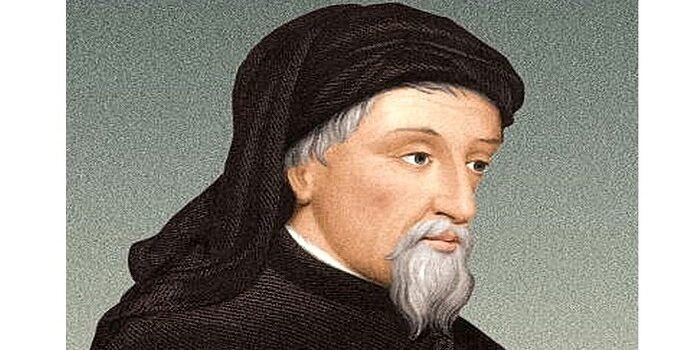The General Prologue to the Canterbury Tales by Geoffrey Chaucer - Summary
It
is now April, springtime, and this makes people want to go on pilgrimages,
especially to Canterbury, to seek the remains of the saint that helped them.
Before embarking on the pilgrimage the narrator (who speaks in the first person
and is a character in the story) goes to the Tabard, an inn, to sleep. At night
29 men come into the Tabard, and they happen to be going to Canterbury as well.
The narrator joins them. Before the tale continues however the narrator wants
to introduce to us his fellow travelers:
1.
A Knight- described in
terms of the values he honors- "trouthe and honour, freedom and
curteisye". He traveled far and wide, was valiant in many wars and battles
and is honored for all of this. He is "as meeke as is a maide", and
is described according to the vision of the ideal courtier.
The knight wears a tunic under his mail coat
and his horse is fine
2.
A squire- the knight's son.
A bachelor and honorable suitor of women, a gentleman. He too has fought
tournaments. He rides well.
3.
A yeoman (an independent
commoner who acts as the knight's military servant)- has a bow, is dressed
colorfully in military attire.
4.
A Prioress (mother superior
of her nunnery)- she is sincere and mild, can sing and speak French, has good
table manners. She is not described as noble but as taking pains to appear
noble, to imitate nobility. She has rosary beads and a gold brooch indicating
perhaps well to do familial background. She has with her another nun and
three/one priests.
5.
A monk- a manly man, worthy
of being a monk. This may be ironic. He is in charge of distant property of his
church. Instead of studying or working he liked to hunt and was a good rider.
He is bald (prolly not a good thing). He is fat (probably a mark of not
working). He is a typical church man (criticism of church!).
6.
A friar
7.
A merchant
8.
A clerk
9.
A sergeant of the law (a
lawyer and judge)
10.
A frankenlain (a wealthy
gentleman farmer, owner of lands but not nobly born)
11-15. A haberdasher, a carpenter, a weaver, a dyer and a
tapestry maker- all clothed in the uniform of their guild
16.
A cook- has an ulcer but ah
well he can cook and that's enough for a cook (cooks are dumb)
17.
A shipman (sailor)
18.
A doctor- very knowledgable
in medicine, disease, cure and astrology. Likes money
19.
The wife of Bath- knows all
about love, having had 5 husbands. She rode, like a man, and had been all over
the world
20.
A parson- a true and
faithful Christian. This does not seem to be ironic, I'm pretty sure he is
truly good
21.
A reeve (superintendent of
a large farming estate)
22.
A miller
23.
A somnour (a summoner- one
who summons people to appear in court; a public prosecutor)
24.
A Pardoner- (a man who
pardons sins in exchange for money contributed to the institution he
represented (hospital of Roncesvalles in Spain)) He has lots of religious
artifacts and insignia on his clothing. He has pieces of holy things which are
expensive and representative of his being very devout. In fact he had pig bones
which he passed of as the bones of saints! The rascal. He got money through
flattery and tricks.
25.
A manciple (steward of a
community of lawyers in London)
26.
The narrator
At
the end, after he finishes introducing the characters, the narrator says that
he owes it to the reader to be as faithful as possible to the stories, even if
they are a bit nasty, and he apologizes to the reader and asks not to think of
him as rude (he cites Plato and Jesus as figures who promote truth). This is
cheeky because he doesn't have to be disgusting as they are made up characters-
this is a mechanism to create realism in the narrative.
The scene returns to the hotel. They all dine and pay, and then the manager of the inn (the Host). He offers to accompany them along the way if they agree to his terms and in exchange he will provide entertainment. They agree and he says they will each tell two tales each way of the journey. The one who tells the best tale will get a free supper that the Host will make at the expense of all the others. He also says if anyone doesn't agree to this they will have to pay all of the expenses of the entire party along the way (how is this fair???). They made him head of their party, settle disputes and judge the tales. They draw lots to see who will go first and it is the Knight.









Comments
Post a Comment
Hey friend! 🌈 I can't help with your assignments but maybe other readers can. Good luck! 🤞